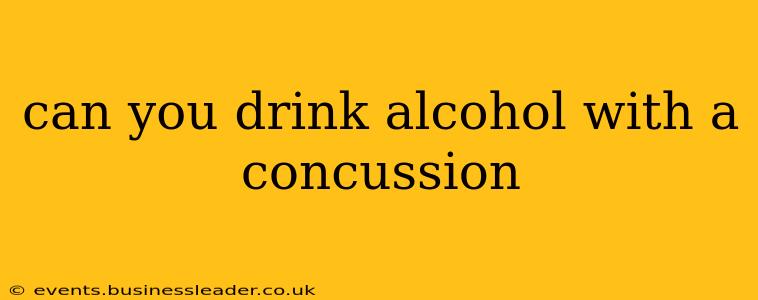A concussion, also known as a mild traumatic brain injury (mTBI), is a serious injury that requires careful management. While the immediate effects might seem minor, the brain is vulnerable, and certain substances can significantly hinder the healing process. One such substance is alcohol. The simple answer is no, you should absolutely not drink alcohol if you have a concussion.
Alcohol's impact on the brain, particularly after a concussion, is multifaceted and potentially detrimental. Let's delve into the reasons why abstaining from alcohol is crucial for concussion recovery.
Why Alcohol is Harmful After a Concussion
Alcohol is a depressant, meaning it slows down brain activity. After a concussion, your brain is already struggling to function optimally due to the trauma it has sustained. Introducing alcohol further slows down this already compromised system, potentially exacerbating symptoms and delaying recovery. This can lead to:
- Increased inflammation: Alcohol can increase inflammation in the brain, which can prolong healing and increase the risk of long-term complications.
- Slower healing: The brain needs time and rest to repair itself after a concussion. Alcohol interferes with this process, potentially delaying recovery.
- Worsened symptoms: Alcohol can worsen concussion symptoms such as headaches, dizziness, nausea, vomiting, and cognitive difficulties. It can also intensify confusion and memory problems.
- Increased risk of complications: In severe cases, alcohol consumption after a concussion could increase the risk of more serious complications, such as post-concussion syndrome.
- Medication Interactions: If you're prescribed medication for your concussion, alcohol can interact negatively with these drugs, leading to dangerous side effects.
What Happens if You Drink Alcohol After a Concussion?
The effects of alcohol consumption after a concussion can vary depending on several factors, including the severity of the concussion, the amount of alcohol consumed, and individual sensitivities. However, you can expect potential consequences like:
- Intensified headaches: Alcohol can trigger or worsen headaches, a common symptom of concussion.
- Increased nausea and vomiting: These symptoms can be severely exacerbated by alcohol.
- Cognitive impairment: Alcohol can further impair cognitive function, such as memory, concentration, and decision-making, already affected by the concussion.
- Increased sleep disturbances: Alcohol may disrupt sleep patterns, which are crucial for brain recovery.
- Prolonged recovery time: Overall, alcohol consumption can significantly delay the healing process.
How Long Should You Avoid Alcohol After a Concussion?
There's no single definitive timeframe for avoiding alcohol after a concussion. The duration depends on the severity of the injury and the individual's response to treatment. However, it's generally recommended to completely abstain from alcohol until you're fully recovered, as determined by a healthcare professional. This often means several weeks, or even months, after the initial injury. Your doctor will provide personalized guidance based on your specific case.
What Should You Do Instead of Alcohol?
Focus on supporting your brain's recovery through:
- Rest: Get plenty of sleep and avoid strenuous activities.
- Hydration: Drink plenty of water.
- Healthy Diet: Eat a balanced diet rich in fruits, vegetables, and whole grains.
- Follow Doctor's Orders: Adhere strictly to your doctor's recommendations regarding medication and activity levels.
- Cognitive Rest: Avoid mentally demanding tasks until your brain has healed.
Can Alcohol Mask Concussion Symptoms?
This is a crucial point. Alcohol might temporarily mask some concussion symptoms, making you feel better. However, this is deceptive. It doesn't actually heal the injury; it simply suppresses the symptoms, leading to a false sense of recovery and potentially delaying proper medical attention and treatment. This delayed care can have serious long-term consequences.
Remember, your health and well-being are paramount. Always consult your doctor or other qualified healthcare professional for personalized advice on concussion management and recovery. Ignoring the risks associated with alcohol consumption after a concussion can have serious, long-lasting consequences.
